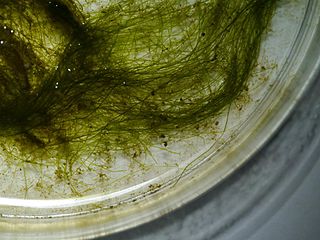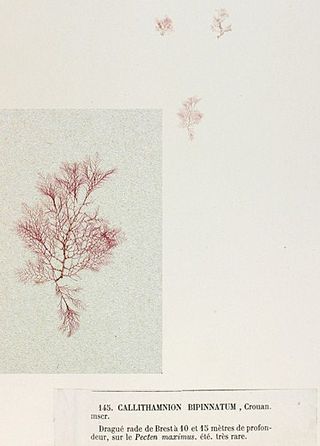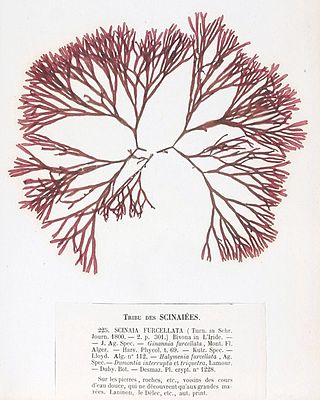
Gracilaria is a genus of red algae (Rhodophyta) notable for its economic importance as an agarophyte, as well as its use as a food for humans and various species of shellfish. Various species within the genus are cultivated among Asia, South America, Africa and Oceania.

The Corallinaceae are one of the two extant Coralline families of red algae; they are differentiated from the morphologically similar Sporolithaceae by their formation of grouped sporangial chambers, clustered into sori. The Corallinoideae is monophyletic; the other subfamilies form another monophyletic group.

The Delesseriaceae is a family of about 100 genera of marine red alga.

Rhodomelaceae is estimated to be the largest red algae family, with about 125 genera and over 700 species.

Vaucheria is a genus of Xanthophyceae or yellow-green algae known as water felt. It is one of only two genera in the family Vaucheriaceae. The type species of the genus is Vaucheria disperma.
Bangia is an extant genus of division Rhodophyta that grows in marine or freshwater habitats. Bangia has small thalli with rapid growth and high reproductive output, and exhibits behavior characteristic of r-selected species. The plants are attached by down-growing rhizoids, usually in dense purple-black to rust-colored clumps. The chloroplasts of Bangia, like others in the division Rhodophyta, contain chlorophyll a and sometimes chlorophyll d, as well as accessory pigments such as phycobilin pigments and xanthophylls. Depending on the relative proportions of these pigments and the light conditions, the overall color of the plant can range from green to red to purple to grey; however, the red pigment, phycoerythrin, is usually dominant.

Galaxaura is a genus of thalloid red algae.

Nemaliales is an order of red algae.

Laurencia is a genus of red algae that grow in temperate and tropical shore areas, in littoral to sublittoral habitats, at depths up to 65 m (213 ft).

Kallymeniaceae is a red algae family in the order Gigartinales.

Wrangeliaceae is a red alga family in the order Ceramiales. It was published by J.Agardh in 1851 in his book Species, genera et ordines algarum : seu descriptiones succinctae specierum.

Callithamniaceae is a family of red algae (Rhodophyta) in the order Ceramiales. The family was first described by Friedrich Traugott Kützing in 1843.

Champia is a genus of red algae in the family Champiaceae, first described in 1809 by Nicaise Auguste Desvaux

Aglaothamnion is a genus of algae belonging to the family Callithamniaceae.

Wrangelia is a genus of red algae in the family Wrangeliaceae.

Callithamnion is a genus of algae belonging to the family Callithamniaceae.

Scinaiaceae is a family of red algae (Rhodophyta) in the order Nemaliales.













